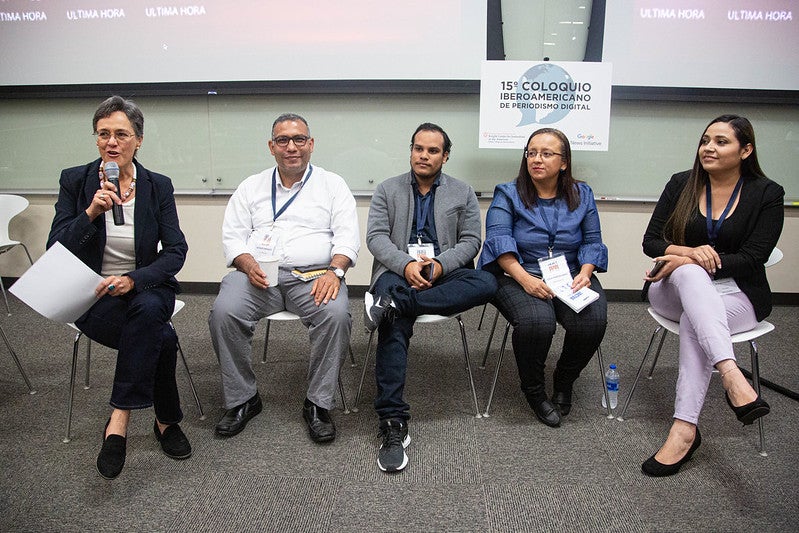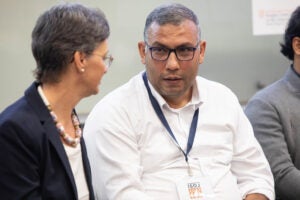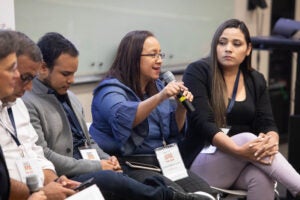April 4, 2022 | Coloquio, Digital Native Media, Freedom of Expression, ISOJ2022, Mental Health
Devastated by the Ortega-Murillo administration, Nicaraguan journalism bets on resistance, resilience and reinvention

“Brave,” “hopeful,” “combative,” and “creative.” This is how four Nicaraguan journalists described in one word the journalism that is carried out in their country during the panel “SOS Nicaragua: Imprisoned, persecuted and exiled journalists” that took place on April 3 during the 15th Ibero-American Colloquium on Digital Journalism at the University of Texas in Austin.
Lucía Pineda, Octavio Enríquez, Hans Lawrence Ramírez and Jennifer Ortiz spoke with the moderator of the panel, Dagmar Thiel, CEO of the NGO Fundamedios, about the conditions in which journalism is carried out, how they manage to overcome obstacles in the field and in exile, and even how the international community can help them overcome these barriers.
The situation of journalism in Nicaragua worsened in 2018 when massive citizen protests against President Daniel Ortega’s administration took place and were reported by different media. In retaliation and since then, news about journalists being beaten, harassed, persecuted, imprisoned, forced into exile and even the confiscation of media by the authorities have been commonplace. The year 2021, for example, was listed as the most violent year against the press since 2018.
Nicaraguan journalists, however, are not giving up and they made that clear.

“I don’t want you to see us as defeated because we’re not. We continue doing journalism and we are going to continue,” said Octavio Enríquez, an investigative journalist for Confidencial, a media outlet whose headquarters have been raided twice.
Enríquez explained, however, that doing this type of journalism “is like poking around in the dark,” especially considering that even sources suffer reprisals if they dare to speak out.
He explained that three laws are responsible with how the press is persecuted: in the first one they try to punish so-called fake news – but it is up to the authorities to define what is fake news. The second has to do with the type of financing the media and organizations receive, and this is the law that was used to accuse journalists and representatives of the Violeta Barrios de Chamorro Foundation. Finally, the third law has to do with sovereignty. With it, criticism against the government can be portrayed as treason against the country.
“And I’m not saying it theoretically. Most of the more than 40 people who were detained, including journalists and seven presidential candidates . . . were precisely accused, and they were recently convicted for that, for those ‘crimes,’” Enríquez said. “So, it is a completely adverse context, and the truth is that what we have made a commitment [to continue reporting].”

Lucía Pineda, director of the 100% Noticias channel, was one of those journalists imprisoned for practicing her profession. “To us, [reporting] has cost us our freedom, our lives, and also . . . it has exiled us, and has put others in jail.”
On the night of Dec. 21, 2018, the police broke into the news outlet and arrested Pineda, Miguel Mora (then director and founder of the outlet) and Verónica Chávez, executive director of the outlet, who was released hours later. According to Pineda, they were taken to El Chipote, “a torture prison,” and later she was transferred to another prison where she was isolated, held incommunicado and even had to sleep on the floor.
“I want to tell you that, literally, Nicaraguan journalism has been razed. It was razed. It was so bad we should all be dead,” said Pineda. “Overwhelmed in everything: without a television channel, without a team, without our freedom to inform, many forced into exile.”
Six months later, she was released from prison “desperate” to open 100% Noticias, this time through a completely digital platform. The channel’s headquarters was confiscated that same December 2018 and later converted into a rehabilitation center that, according to Pineda, “It’s not even being used.” She said they have managed to continue reporting on Nicaragua free-of-charge, because despite having subscription models, she points out that the country’s economy is not good enough to be able to charge their audience. Through donations of some people and grants to which they have applied, they have managed to obtain resources.
“What we are experiencing is sad, but I think there is hope because we are alive, because we are free, although in exile, and we continue to resist. And the best way we have to defend freedom of the press is by carrying out our work as journalists,” Pineda said.
One of those outlets that has continued to defend freedom of the press despite the obstacles has been the newspaper La Prensa. In its more than 95 years of history, they first saw the blockade of their press raw materials by customs. According to what they denounced, the newsprint and the ink remained withheld.
Given this fact, explained Hans Lawrence Ramírez, a journalist for the newspaper, they printed two covers in which they tried to explain to their audience the seriousness of the matter. One of them, for example, was completely blank except for a statement: “Have you ever imagined living without information?”
Added to this blockade was the illegal search of its facilities by the police. Since Aug. 13, 2021, the facilities have been under police custody. The police do not allow anyone to come in, not even to maintain the press machines or to protect the newspaper library that contains “almost a century of [Nicaragua’s] history.” The confiscation of its headquarters also meant the loss of at least 130 jobs: among journalists, administrative and technical personnel, he said. Likewise, the only remaining printed newspaper in the country came to an end.
Ramírez himself has suffered first-hand the dangers of being a journalist. In March 2020 he suffered a brutal beating. He finally decided to go into exile to get himself to safety.
That is why Ramírez says journalism in the country has to be done with the three R’s: resistance, resilience and constant reinvention. La Prensa, for example, “has reinvented itself over and over, and it continues to exist underground from Nicaragua, mainly from exile, and in a totally digital format.”
For Jennifer Ortiz, who was also forced into exile after seeing how her family was being exposed to the dangers of journalism, the country’s crisis somehow helped the outlet she and her husband created, Nicaragua Investiga.
“There was a huge thirst for information, people wanted to know what was happening and people were looking for media outlets,” Ortiz explained. However, she said that what has helped them the most is “the credibility that independent media have built over many years.”
Ortiz said that contrary to the the Ortega-Murillo apparatus, where that family has invested in the media, causing between 80-90% of the country’s media to be pro-government – according to their figures – the independent media have had to work with limited resources, but they persist thanks to the credibility they enjoy.
And it seems be successful. Nicaragua Investiga already has 160,000 followers on its YouTube channel, 200,000 on Facebook and 50,000 on Twitter.
“Journalism today is more necessary than ever. It is more necessary because we need the world to know what is happening in Nicaragua, that massive disinformation machinery the government of Daniel Ortega has, which is always selling a completely different image of what is really happening in the country,” Ortiz said. “There really are two Nicaraguas. The real Nicaragua, which is what you are seeing here: exile, confiscation, death, more than 328 victims in 2018, more than 170 political prisoners, more than 140 exiled journalists. That says a lot and contrasts with what the Daniel Ortega’s government has said.”
The journalists also spoke to the international community about what it could do to help. From donating equipment to replace much that was confiscated or destroyed, to continuing to report what is happening in the country. They also called for continuing training for the country’s media and journalists. But they especially called for the large technology platforms to help promote information related to the country and to analyze any claim about the content of these media with other eyes that include the context of Nicaragua.
“I know there are many provisions that are in the parameters of both YouTube and Google, [but] the situation in Nicaragua is different from other countries. I think there must be a bit of understanding there, because there are claims that are beyond all logic,” Pineda said.
You can watch the video of the entire 15th Ibero-American Colloquium on Digital Journalism, in Spanish. The annual meeting, traditionally held after the International Symposium on Online Journalism (ISOJ) in Austin, Texas, is organized by the Knight Center for Journalism in the Americas.

